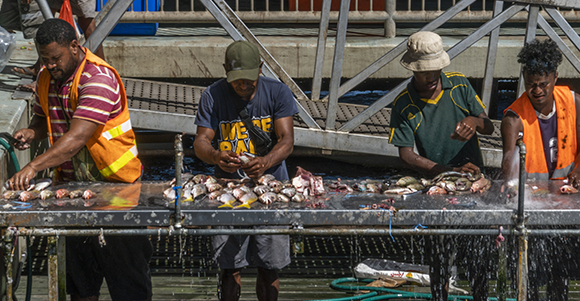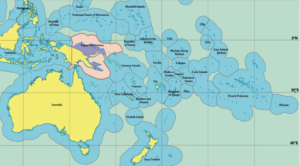A profile of the fisheries sector in Papua New Guinea including markets, licenses, permits and major players.
Industry snapshot
Including its islands, PNG has 17,000km of coastline and a 2.4 million square km exclusive economic zone (EEZ), the largest in the South Pacific. The country supplies about 18 per cent of the world’s tuna catch, a percentage that has been steadily rising since 2010.
The waters around PNG contain large stocks of marine resources. Within its EEZ are large varieties of fish, the most important of which is migrating schools of tuna. Besides the abundant tuna and other pelagic species several other commercially important fish, shellfish and sedentary species are found in PNG waters. More than 10,000 species of fish, molluscs and crustaceans have been identified.
Coastal commercial fishing is based primarily on prawns, lobster and barramundi, and a collection of sedentary fisheries resources, including beche-de-mer, trochus shells, pearl shell and green snail. Small-scale commercial fishermen carry out by the operations, and sell their product to small-to-medium-sized fish processing and marketing entrepreneurs. Sea cucumber is collected and processed for export. The trade in shells with lustrous interiors is small but growing.
Inland fish production is still underdeveloped, although some commercial fishing of trout and carp has been undertaken by farmers in the Highlands region of the country.
The major emphasis of the government is the development of industrial and commercial fisheries, which can help to provide the infrastructure and market necessary for small and medium scale fisheries development. It is committed to encouraging more value-adding in the fisheries sector.
PNG’s tuna processing is a major employer in the country, with processing plants in Lae and Madang. There is also considerable potential upside. According to the APEC Business Advisory Council (ABAC), the industry could generate an additional US$1 billion (K3.4 billion) a year in revenues and employ 250,000 more people.
In December 2017, PNG began providing rebate to foreign fleets that process their fish onshore. According to the Manufacturers Council of Papua New Guinea, the subsidy regime has more than doubled domestic fish processing.
In October 2019, a review of work permits and visas, especially for those from neighbouring Pacific Island countries, was announced. The review will look at the 2017 Vessel Day Scheme (VDS), which saw the domestic tuna processing and fishing industry paying the same fee of US$10,500 (K35,713) as distant water fishing nations (although they were given refunds if they landed their fish in PNG). Under the VDS, the country’s six tuna processors get a rebate of US$400 (K1360) for every metric tonne of tuna produced. About four fifths of the fish caught in PNG waters is processed in other countries.
Frozen tuna constitutes about half of PNG’s tuna exports, followed by canned tuna, cooked loins, fishmeal and chilled tuna.
Areas of direct interest include the Bismarck Sea, Solomon Sea, Gulf of Papua, Torres Strait, and the maritime border with the Solomon Islands. The EEZ is rich in fisheries resources and subject to intense legal and illegal fishing from domestic and international sources. It is considered one of the last remaining wild fisheries regions in the world. According to the National Fisheries Authority, stocks of two of the three main tuna species (yellowfin and bigeye) are now considered close to full exploitation levels, which may affect future expansion of the purse seine and longline fisheries.
In 2016, 36 locally based foreign (chartered) and 31 PNG purse seiners made up the PNG fleet of 67 vessels. The number of Papua New Guinean local longline fishery vessels has declined partly because of the closure of the shark longline fishery in 2014 and falling catch rates.
The NFA-run National Fisheries College in Kavieng, New Ireland Province, is PNG’s leading fisheries and marine resources training and education institution.
Markets
PNG accounts for approximately a tenth of the world’s tuna catch. According to the Bank of Papua New Guinea, export income from marine products in 2018 was K613 million (US$180 million).
Major destinations for PNG’s marine products include Hong Kong, Japan, Australia and the European Union (EU).
PNG exports of tuna-based products to the EU under an EU–APC Economic Partnership Agreement that gives it tariff-free access to the EU trading zone.
Governance and legislation
The PNG National fisheries Authority (NFA) is the primary regulatory and management body for the sector. It provides support and coordinates fishery development in the country. It also facilitates export certification and regulation, and manages fisheries resources for sustainable growth.
The NFA is a non-commercial statutory authority established in 2001 and operating under the Fisheries Management Act 1998and related regulations. Its role is to regulate and oversee the development of the fisheries sector for maximum sustainable benefit for the people of PNG.
The National Tuna Fishery Management and Development Plan 2014 dictates the development of PNG’s major fisheries export. PNG is a member of the Parties to the Nauru Agreement (PNA), a regional agreement that covers the exploitation of the Pacific tuna fishery.
Licences and permits
The following fisheries-related facilities require a licence to operate from the NFA:
- Fishing vessels
- Fish storage facilities/fish factories
- Fish factories
- Fish export facilities
- Fish buyers
- Aquaculture
General Licence Information, a brochure stating the complete requirements for the various licence applications and fees, is available from the NFA. Vessel licence fees are dictated by the length of the vessel.
Among other material, short-based licences must be accompanied by
- A proposal/business plan (a Model Business Plan for Coastal Fishing can be obtained from the NFA’s Licencing Unit)
- Endorsement from the provincial executive Council or Appointee of the Province where the facility will be situated
- An NFA audit/inspection report from an Authorised Provincial Fisheries Officer (dry goods) or NFA Audit & Certification Officer (wet goods
- Plans and specifications for the facility.
Among other material, new chartered locally-based foreign fishing vessel licence applications must be accompanied by:
- National Maritime Safety Authority Certificate of Survey/Inspection
- Certification of Registry in the Port of Registry
- Forum Fisheries Agency (FFA) Certification of Vessel Registration on the Regional Register
- FFA Certification of Registration of Automatic Location Communicator (Vessel Monitoring System)
- Cargo Ship Safety Certificate
All commercial buyers of sea cucumber as well as gold-lip and black-lip oysters, trochus shells, green snail and lobster need to have a licence issued by the National Fisheries Authority. These are restricted to nationally owned companies. Barramundi licencees are only allowed one station with a series of holding cages not exceeding 20 in number for each management area.
Live reef fish operators must obtain the following licenses from the NFA:
- Export
- Aquaculture
- Carrier vessel
- Storage facility
The export of target species at sizes less than the approved size limit is prohibited.
Fishing within close proximity of a declared spawning aggregation site is prohibited, as is fishing for live reef food fish or other related activities within or close to the known diving spots is prohibited. The use, storage and transportation of explosives is prohibited.
All enquiries regarding licences should be to the NFA’s Licensing and Data Management Business Group:
National Fisheries Authority
11th Floor, Deloitte Tower
Douglas St., Port Moresby
Tel: +675 309 0444
Fax: +675 320 2069/320 2061.
Major players
The peak body for the tuna industry in PNG is the PNG Tuna Industry Association, which is a member of the Pacific Islands Tuna Industry Association, based in Honiara, Solomon Islands.
Onshore fish processing is situated on the northern coast of the PNG mainland. R D Tuna Canners in Madang Province was the first major integrated tuna processing operator in PNG. Several others have since started in Lae, Morobe Province, including Frabelle, Internal Food Corporation and Majestic Seafoods.
Pacific Marine Industrial Zone
The official launch of the construction of theUS$161 million (K521 million) Pacific Marine Industrial Zone (PMIZ), which is planned to be Papua New Guinea’s first Special Economic Zone (SEZ) project, was launched in November 2015.
In 2017, however, it was announced that there had been delay after China’s Exim Bank insisted on a new concessional loan of US$61 million (K194 million) on top of the original US$95 million (K300 million) secured under phase one.
The PMIZ is to be situated along the north coast of Madang Province on a 215-hectare area of land. Adjacent to existing tuna processing facilities, it is proposed that the PMIZ will provide wharfing, berthing and processing facilities and other infrastructure necessary for an export-focussed onshore fish processing industry to develop. The zone will also be open to non-fisheries-related businesses.
The PNG Government has invited other Pacific countries to consider locating their tuna-processing facilities within the PMIZ and is promoting the venture through the Department of Commerce and Industry.
Businesses interested in setting up within the PMIZ should contact the PNG Investment Promotion Authority or the Department of Commerce and Industry.
Tax concessions
Accelerated depreciation is available if the plant and equipment is used solely for commercial fishing activities of residents. There is a 5 per cent withholding tax on fishing royalties payable to landowners.
Resources
- Department of Commerce and Industry
PO Box 375 Waigani, NCD. 131
Tel: +675 301 2806
Fax: +675 325 2403
- Papua New Guinea Investment Promotion Authority
- National Fisheries Authority
- National Maritime Safety Authority
- Pacific Islands Forum Fisheries Agency
- Parties to the Nauru Agreement
- Western and Central Pacific Fisheries Commission
What else would you like to know?
This sector file is a living document created as a service to our subscribers. It is updated from time to time, as new information comes to hand.
Is there something else you’d like to know about this sector? Is there new information we haven’t included? Let us know in the Comment section below, or email editor@businessadvantageinternational.com and we’ll look into it.










Speak Your Mind